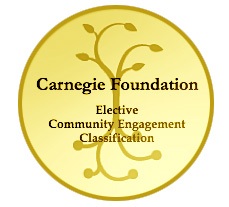MACON – The Carnegie Foundation for the Advancement of Teaching has renewed Mercer University's Community Engagement Classification, first awarded in 2008, for another 10 years. Only a small percentage of U.S. colleges and universities pursue and are awarded this classification.
“The Carnegie classification in community engagement is the nation's gold standard in measuring an institution's commitment to marshaling resources to serve local and international communities by engaging students in service-learning and fostering faculty community-based research,” said Dr. Mary Alice Morgan, senior vice provost for service-learning. “Mercer was one of the earliest institutions to earn the designation in 2008, and we are proud to have continued building upon our strong tradition, joining with other fine institutions such as Duke, Tulane and Emory. Every school and college within Mercer University partners with an extensive array of community agencies and organizations to advance communities' well being.”
The Carnegie Foundation announced newly classified institutions on Wednesday, bringing the total number of institutions that now hold the Community Engagement Classification to 361.
Community engagement is defined by the Carnegie Foundation as collaboration between institutions of higher education and local, regional, national and global communities for the mutually beneficial exchange of knowledge and resources in a context of partnership and reciprocity.
Through community engagement, colleges and universities and the public and private sectors work together to enrich scholarship, research and creative activity; enhance curriculum, teaching and learning; prepare educated, engaged citizens; strengthen democratic values and civic responsibility; address critical societal issues; and contribute to the public good.
The elective classification is based on voluntary participation by institutions and involves data collection and documentation of important aspects of institutional mission, identity and commitments, and requires substantial effort invested by participating institutions.
The classification is not an award; it is an evidence-based documentation of institutional practice to be used in a process of self-assessment and quality improvement.
The Carnegie Foundation for the Advancement of Teaching is a nationally based education policy and research center founded by Andrew Carnegie in 1905 and chartered by an act of the U.S. Congress in 1906.
The Carnegie Foundation is committed to developing networks of ideas, individuals and institutions to advance teaching and learning. The foundation joins together scholars, practitioners and designers in new ways to solve problems of educational practice. Toward this end, it works to integrate the discipline of improvement science into education with the goal of building the field's capacity to improve.










